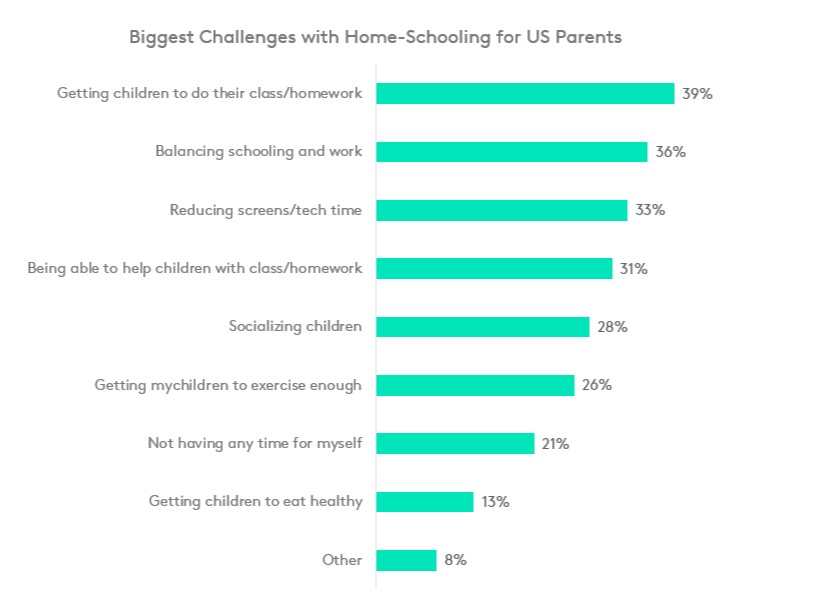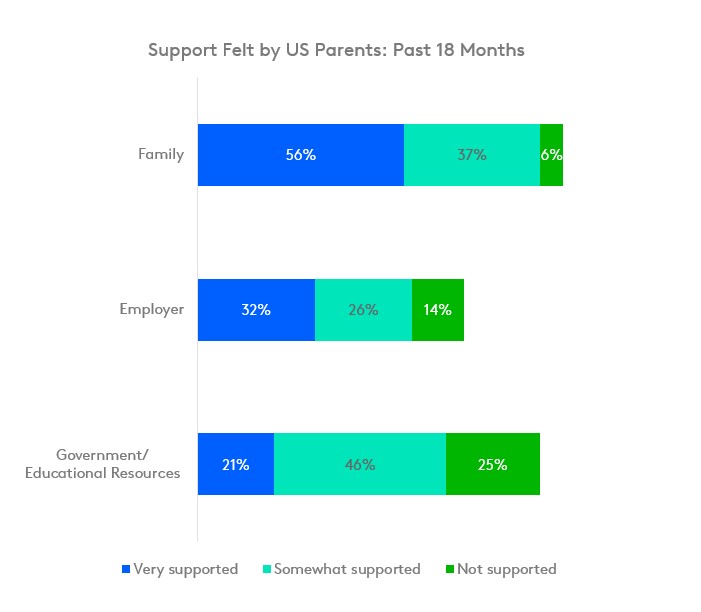Daily life for families has been significantly impacted due to the COVID-19 pandemic. And with school closures forcing many children into home-schooling, parents have had to balance responsibilities for their children, their household, other loved ones and employers.
So, Kantar has conducted an online survey, asking about their experiences whilst raising children during the pandemic and found that there are some real positives from the pandemic. Explore some of our US findings here as well as additional answers from other countries within the complete report.
How long did parents home-school their children?
In the US, 70% of parents report to have home-schooled their children for more than 13 weeks due to the pandemic. This was the second highest (behind Brazil at 79%), in comparison to 49% across global markets.
59% of American parents of children aged 0-4 years old report that their child did not attend pre-school or day care during the pandemic.
What were the biggest challenges for US parents when home-schooling?
While three quarters of parents did enjoy some of their home-schooling experiences (76%), there were also challenges.
Getting their children to do their class or homework (39%) and balancing schooling for their children with their own work (36%) and limiting screens throughout the day (33%) were the three greatest challenges faced by parents.

Do parents have any concerns around their children returning to the classroom?
The biggest concern felt amongst parents in the US of children returning to the classroom is that they might contract the COVID-19 virus, reported by 45%. Masks being required is the secondary concern (42%) while their children being behind in their education is the third highest concern (37%).
What role has the pandemic played on the employment of parents?
Over half of parents who home-schooled their children state that the pandemic changed their employment status (55%), with 12% leaving work entirely to balance home-schooling duties. 67% of parents on parental leave either extended their leave (42%) or decided not to return to work (15%) due to the pandemic in order to care for their children aged 0-4. This was lower than the global average of 79% extending parental leave or not returning to work.
Six out of 10 US parents state that the pandemic had an influence on them not using day care or pre-school with 44% extending their leave due to the pandemic in order to care for their children aged 0-4.
How supported have parents felt during the pandemic?
58% parents felt supported by their employer in the past 18 months. This is lower than the global average of 69% but also lower than the support they felt by government and educational resources (67%). The most support has come from their own family, with over 9 out 10 parents reporting to have felt supported by their family during the pandemic (92%).

Are there any changes made through the pandemic that parents would like to see continue long-term?
Of US parents we interviewed, 14% want life to go back entirely to how it was before the COVID-19 pandemic. However, 64% enjoyed more quality family time and would like to see that continue.
Get more answers
For more findings from this study, access the complete Community Report: Connecting with Parents and Caregivers. Find additional country specific answers on family leave and day care, the impact of homeschooling on employment, parenting young adults, the impact on caregivers, and more.
About this study
This research was conducted online among 5,865 people across eight global markets: US, UK, France, Germany, India, Singapore, China and Brazil.
Respondents were sourced from the Kantar Profiles Network. All interviews were conducted as online self-completion between 22 July and 9 August 2021.
